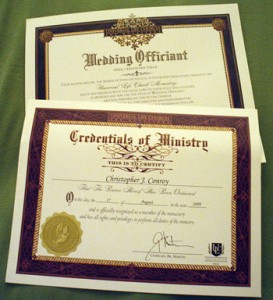Certified
Originally published at The Searcher Journal. You can comment here or there.

As someone who stands outside of all the mainstream religious institutions, there are some things that, once upon a time, were kind of tricky to do without bending or breaking either one’s beliefs or the law.
Back in the early days of the World Wide Web, a group came along that made doing at least one of those things infinitely easier.
The Universal Life Church hit the Web kind of big in the mid to late 1990s. I was in college and involved more than a bit with a group of self-identified pagans, witches and other assorted metaphysicists. Creative and caring people, all, we were thrilled to hear that we could now become ordained as ministers with just a few clicks of the mouse.
What did that mean? Mostly, at that time, for most of us, we could wave around a fancy title and wistfully drone on about how we were now “official” in one sense or another. On a deeper level, though, it meant that in the eyes of the law, we were now able to do things that only the hierarchy of the major religions or duly appointed civil officials could do. Things like officiate weddings and create congregations.
Many who become ordained by the ULC do nothing other than smile with the knowledge that they’ve “bucked the system” just a little bit. So there is little danger of things actually going bad.
Those who do use their new credentials, do so to perform weddings for their friends, help build community, and take on the task of becoming educators and spokes people for their particular brands of faith. They are empowered to become better, they seek out the knowledge and wisdom-or use their official ordination to legally put that knowledge and wisdom to good use.
The world has changed a lot since the ULC first hit the web. Minority religions have gained much more recognition-usually by tooth and nail legal battles against those who just don’t understand where they’re coming from. Wicca and a few other pagan religions are officially recognized now and there’s not quite as much need for the “anyone can get ordained” credo of the ULC.
More than a decade since I first clicked through the original ULC website, I’ve re-registered and become (again) an ordained minister. This time, I’ve dropped the few dollars to have all the paperwork printed up and sent to me.
This time, I’ve got a much more clear purpose. Years of actual work and contemlation, study and practice, have lead me to the knowledge and wisdom that I think any practicing minister (of any faith) should have. Now I can proudly and more legitimately lay claim to a title of authority-no matter the issuing body.
But more important than all that, I’ve been asked to officiate the wedding of a dear old friend’s sister-in-law.
And that-that bit of trust and respect, that call for responsibility-would make me jump through just about any hoop to make it happen.